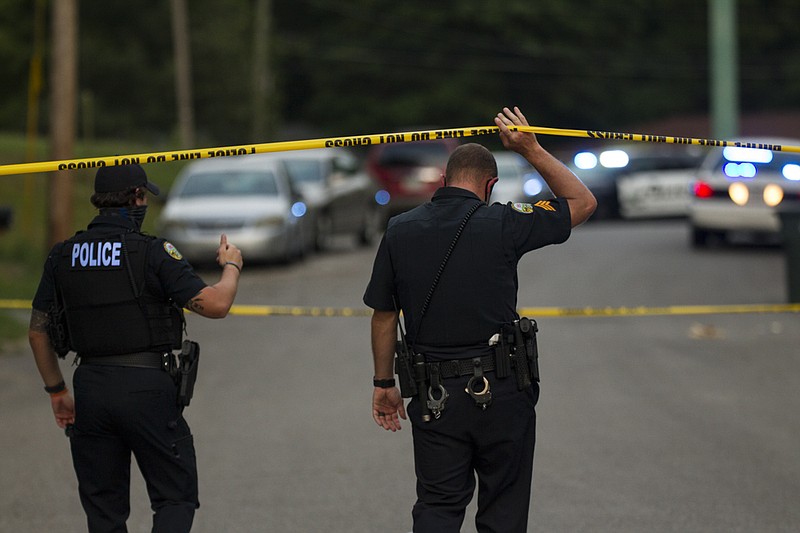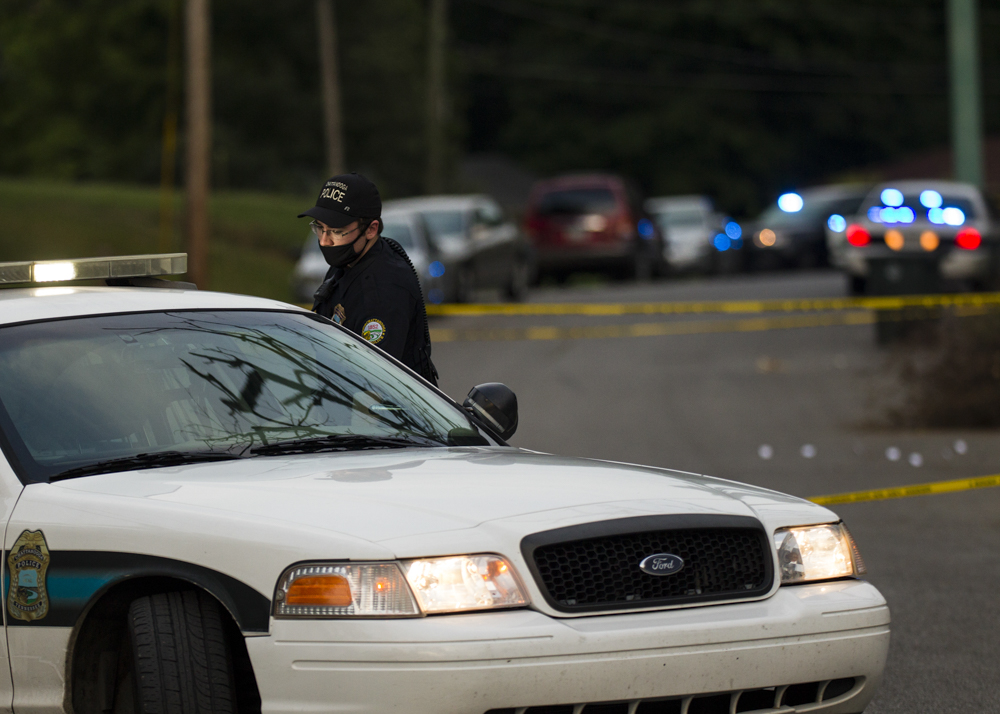June was Chattanooga's worst month for gun violence this year, and not unlike last year, July is on track to be the same.
In a year of tumult, the city has seen a recent uptick in gun violence, but it's not unusual compared to previous years.
The COVID-19 pandemic, deadly tornadoes and near daily protests against police brutality in the wake of George Floyd's death while in Minneapolis police custody have proven to be a challenge for Chattanooga police, they say. But it hasn't deterred them from directing the necessary manpower and other resources where needed.
There have been 78 shooting victims this year so far, 12 of whom have died, according to Times Free Press records. By this time last year, there were 71 victims, including 12 deaths.
Those numbers exclude accidental, self-inflicted and justified shootings. Shootings, even those that are fatal, can be ruled as justified when there is no criminal intent, such as with self-defense.
What's driving the violence?
Every year, beginning around April, the number of shootings starts to rise in Chattanooga. Warmer weather and more hours of daylight leads to more people spending time outside and interacting with each other, which can lead to a greater opportunity for conflict.
In some cases, police have yet to determine a motive. In other cases, shootings are a result of domestic violence or robberies gone wrong.
And some of the more recent shootings are part of ongoing gang disputes, primarily on the city's Southside, police say, though no details have been released and it's not clear exactly which ones are gang-related.
Recently, police noted an immediate increase in gun violence after a gang member was released from jail. Police wouldn't disclose who that individual was but did confirm that he'd been re-arrested.
Sometimes an uptick in gun violence correlates with a main player being released from incarceration, or a new group is on the rise because of an arrest. But those things are difficult to legally prove, which is why police don't often release that information.
Additionally, evidence of gang membership - which is not a crime in and of itself - is considered character evidence, and character evidence generally can't be used at trial because it could lead a jury to convict a defendant based upon the defendant's bad character rather than upon the strength of the evidence.
The victims
Michael Williams Jr., 32, was Chattanooga's first victim of gun violence this year. He was shot multiple times on Jan. 3, allegedly by 46-year-old Marvin Jermaine Davis. Police haven't disclosed a motive.
Williams' wife, Sarah McCullough, rushed to his side at the hospital. She visited him there and then at an assisted living facility as often as she could until visitors were no longer allowed due to the coronavirus pandemic.
He died in late May. Because of the no-visitor policies, the last time his four children got to see him in person was two months before his death, McCullough said.
"It's been rough," she said in an interview. "It's been hard We video chatted every day, but the kids wasn't able to be in his presence before he passed away."
McCullough had been struggling to keep her job at Amazon while raising four children and attending to her husband's care, even from afar. She eventually lost her job, she said, and took up working for a grocery delivery service.
When she heard the news about her husband's death, she screamed.
"I told the kids after I calmed down," she said. "They didn't take it well. They were upset crying, but then they eventually started playing around. I think it's just their way of trying to deal with it.
"The thing that shocked me was the little baby, Little Mikey. He wasn't playing around. He wasn't normal. You could tell he was just sad, and I asked him, I said, 'What's wrong baby? What's wrong?' I said, 'Are you OK?' He said, 'No.' He said, 'My dada, my dada.' For a 2-year-old to have that type of emotion and know what's going on - he's so smart and intelligent. He knows. And you could tell he's affected."
The last time the family video chatted was on Mother's Day. And not long before that, Williams sent his wife a text message: "'I'll be home sooner than you think,' McCullough read aloud. "'Cause I'll do whatever it take to make sure I be there for my family."
His death is hard, she said, but she thinks it'd be easier if her children had been able to physically see their father one last time before he died.
"He was still pretty much in and out of it on sedation the last time they were able to see him," she said. "So they have that memory. They don't have the memory of physically being there and seeing him OK besides on video. They didn't get to get that last touch from him."
The thought of her children growing up without a father hurts her, McCullough said.
"I know how I was without a daddy, and I feel like they're going to grow up with anger and hatred 'cause their dad's gone," she said. "They don't have their dad to tell them, you know, 'Don't date this boy.' My sons don't have their dad to show them how to be a man.
"They don't have their hero anymore."
Since Williams was shot, 10 more people have been killed by gunfire in Chattanooga.
Just this weekend, two separate shootings left one man dead and another injured.
Davon Sherrer, 21, was shot and killed in the 2000 block of Tunnel Boulevard Saturday afternoon. A police officer was flagged down and led to where Sherrer was lying in a driveway with multiple gunshot wounds. He was pronounced dead at the scene.
Just about an hour later, a 30-year-old man was shot in the 4600 block of Kemp Drive. Police were told the man was shot by an unidentified suspect who was in a vehicle.
Eight other shootings - all non-fatal - have taken place since June 30, when 27-year-old Dequan Scott, a father of two, was killed - also on Kemp Drive. Police have not released any information about any potential suspects in that killing.
And on June 22, a 31-year-old father of seven, Robert Dowdy, was shot and killed in a drive-by shooting outside the Nine Brothers convenience store on West 38th Street. Montrell Franklin, 22, was arrested on July 2 and charged with Dowdy's death.
Franklin had just been released from state prison on May 17, according to online Tennessee Department of Corrections records. He'd been out for just 16 days.
Tederick Walker, Derrick McKinney, Kahlil Strickland, Frank Johnson - all fathers - were gunned down between May 8 and June 8.
Steven Hunt, 59, and Allen David Rice, 28, were both shot and killed 14 days apart, allegedly by the same man: 37-year-old Barry Maples. Maples confessed to the killings, according to police, after being arrested in connection to Hunt's death. Maples told police he had been arguing with Hunt just before the shooting, allegedly because Hunt poured out Maples' drink. A motive was not disclosed in Rice's killing.
And Holman Tanner, 20, and Lendell Davis, 34, were shot and killed on March 19 and Jan. 15, respectively.
What have police been doing?
In an effort to quell the violence, police have identified specific areas where shootings have spiked and have deployed additional resources - such as an increased police presence - as necessary.
"Certainly, when you have a small number of individuals committing a disproportionate number of crimes and you begin to focus resources toward those individuals or the area of the criminal activity, you will see improvement," police spokesman Sgt. Jeremy Eames said.
That improvement sometimes takes time to be apparent, but Eames said this year is no different, though there have been challenges along the way.
"This year has definitely been challenging with COVID-19, the tornadoes and protest," he said. "Any time there are extraordinary events that take place, it draws resources. CPD Officers strive to meet the needs of their city, but again, this year has been challenging."
Directing additional resources to problem areas is part of the department's "three-pillar approach" to combat violent crime through community policing, technology and "focused deterrence."
Focused deterrence is simply identifying an issue, whether that is an increase in violent crime or an increase in motor vehicle crashes, and then addressing that issue, whether it be with increased patrols or traffic stops.
In order to identify those problem areas, police often use technology available to them, such as the department's real-time security cameras in place throughout the city or doorbell cameras.
Sometimes that focus turns to individuals themselves rather than geographical areas. Police work to stop the few groups or individuals who they say are driving violence while offering support to those looking for a way out.
"CPD has consistently used an intelligence-led approach to identify the individuals driving the majority of violence within our city," Eames said. "From that we can develop a focused deterrence plan, where we direct or focus resources toward those individuals."
Much like police departments across the country, the Chattanooga Police Department's community policing approach, which aims to emphasize positive interactions with the community, has also had its challenges this year.
"Typically throughout the year CPD holds numerous 'Front Porch Lineups' where we meet and interact with community members in various places throughout the city," Eames said by email. "We also take part in special events and functions within various neighborhoods, both business and residential. However, COVID-19 has made that very difficult to do this year so things aren't quite the same in that respect."
But community members have still been willing to talk with police and share suspect information.
"Witnesses and family members continue to be very cooperative with investigators," police spokeswoman Elisa Myzal said, adding that some investigators have been thanked for the help and for being there, "even with the protests going on and some calling for defunding the police."
Contact Rosana Hughes at rhughes@timesfreepress.com or follow her on Twitter @Hughes Rosana.

